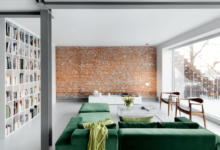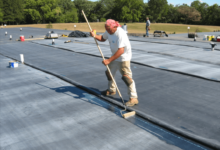When it’s apparent that your house does not have enough area, most homeowners either search for loft space or seek views of the garden. Few people look down.
In many cases, this may be the case. Despite increasing popularity in recent years, basement reconversion numbers are still relatively rare when compared to loft conversions and ground floor extensions.
This is due in part to the fact that only a small percentage of UK homes can turn an existing basement into a liveable living area, which necessitates a more complex excavation task.
However, if you don’t have a lot of garden areas to work with and the loft isn’t an option, basement extensions may be ideal.
A basement conversion may provide the space you’ve been looking for in your home, from a kitchen or children’s playroom to a home cinema or study. Is it worth it, though? Let’s begin with the benefits.
The Case for Converting a basement
A basement conversion keeps the newly established living area close to other primary areas of the home such as the kitchen and living room. If done incorrectly, loft conversions may feel isolated from the rest of the house.
The staircase is a crucial component in establishing this smooth connection. It should merge the basement with the floor above and allow natural light to flow down it.
To maintain your garden,
The loss of a portion of the garden is frequently linked to extensions to the rear of a property. This might be particularly challenging if outdoor space is already restricted.
Underground construction need not be invasive to your home’s appearance, especially if you already have a basement to convert. The use of sliding doors leading out to a staircase or ramp up to the garden allows basement conversions to connect the house and yard just as effectively as an extension.
Fill It with natural light
A basement is typically envisioned as a gloomy, damp space isolated from the rest of the house. And then there are all kinds of monsters lurking in our children’s imaginations.
Artificial lighting will always make up a significant portion of any converted basement’s lighting, but there are several methods to bring in natural light. When installed into the ground floor or an outdoor patio, walk-on roof lights may offer effective daylight from above. Exterior doors and light wells can also be used to provide bright sunshine when necessary.
Sun tunnels that run through the wall, as shown here, are another alternative. Through-wall sun tunnels use a reflective tube and diffuser installed to the inside wall to transmit sunshine from the outside of the house into the interior space.
Increase the Value of Your Home
There is no need for your basement conversion to be a money pit. According to most opinions, it may raise 10% to 20%. It’s vital to get an idea of what the modifications will cost by talking with a local estate agent
The cost of your basement will be lower if no major modifications are necessary. If this is the case, the overall cost per square meter is usually comparable to that of a loft conversion. According to Homebuilding and Renovating magazine, this is estimated to be between £1000 and £1500 per square meter.
The Case Against Converting a basement
Other fees and expenses incurred
The sell-on value of your home will rise after you convert your basement, but the upfront expenses can quickly mount up, especially for excavations that require raising ceilings and underpinning.
Other expenses to consider include architects, drawings, planning permission, and building regulation expenses, which are all typical with most home renovation projects. You must consult with your local authority to figure out exactly what permissions are required.
Although it will cost you money, obtaining a Lawful Development Certificate to be sure that the present usage of a structure is legal for planning purposes or that your proposal does not need planning permission might be worthwhile.
Tanking, which is the practice of waterproofing a basement to prevent damp and structural damage, is one of the most common problems. If you’re doing a basement conversion in your home, get at least a 10-year warranty on it to give yourself peace of mind if something goes wrong.
If you reside in a terraced or semi-detached property and are planning to make changes around or near an adjacent wall, a Party Wall Agreement will be required. It’s critical to communicate your ideas with the neighboring homeowners before beginning so that you can have higher odds of receiving their approval for modifications. If they dislike your plans, you’ll have to pay surveyor fees that may amount to hundreds of dollars.
Incoming orders are delayed because of a variety of reasons.
Basement renovations are a serious kind of extension, and they can take up to nine months for bigger excavation projects. That’s a lot of commotion and turmoil.
If you don’t want to live in your basement because it has solid floors and no existing basement, you’ll almost certainly have to vacate for a while. For tips on living with the builders during basements renovations and situations where you can stay on-site, see our article on living with the builders.
Either way, access is critical for the construction and any machinery required. To assist keep the project on track, you need to minimize as much chaos as possible from getting near to the main portion of the home.
You must consider how your present services will be impacted by the upgrade. Is it possible for your boiler to withstand more radiators? It’s quite probable that you’ll need a new one, which might set you back approximately £2000.
If you’re building a bathroom, you’re plumbing and sewage systems will need to be upgraded, and drains may need to be changed- pushing the price tag up a bit.
Conclusion
When more space in the house is required, basement conversions are well worth considering and will add a lot of value to your home when completed. If you already have a basement to work with, it’s a lot easier, and if the foundations are solid and there is enough height, it’s even simpler still. This sort of conversion is generally faster, cheaper, and does not require planning permission.
Excavation on a larger scale is more difficult, and the expenses are greater. However, with that comes added design freedom. Basement excavations may be the spark you need to inject new life into your home if you are willing to wait and can handle the disruptions.
Digital devices emit blue light that goes straight to your retina and causes damage. Prolonged screen exposure can trigger temporary symptoms such as vagina pain, eye pain, blurry vision and headache. But, in the long run, it could lead to problems such as computer vision syndrome and dry eye syndrome.


